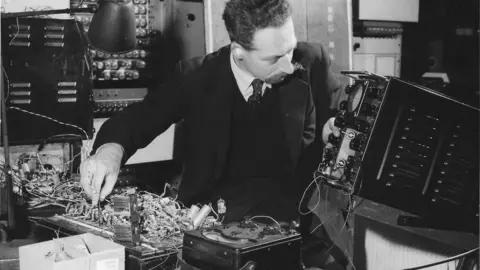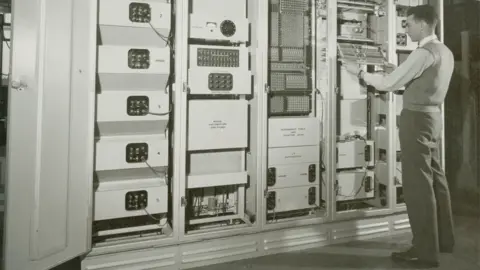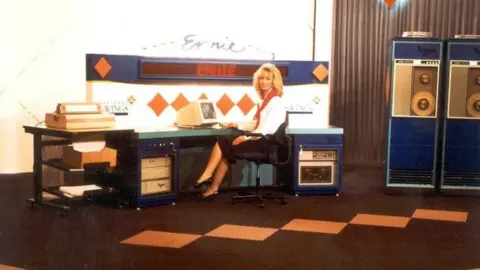New Ernie, same slim odds of winning
It has responsibility for drawing the winning numbers for three million prizes every month, worth £90m, and now it is getting a new lease of life.
Ernie - or Electronic Random Number Indicator Equipment - is the machine which lives in Blackpool making the regular Premium Bonds draw.
Its fifth incarnation - a computer chip the size of a grain of rice - has now drawn its first winners. Selecting the numbers only takes minutes, compared to the nine hours taken by its immediate predecessor and the 10 days it took Ernie 1 to complete the draw.
But, whatever the speed of the selection, there is no improvement in the 24,500-1 odds of each bond winning a tax-free prize of up to £1m.
Ernie's story
In its long history the technology behind Ernie has changed dramatically.
Ernie 1 was developed in the Post Office Research Department in Dollis Hill, north London, where the code-breaking World War Two computer Colossus was constructed.
It was a massive contraption - a hybrid vacuum tube and transistor machine - and it started work in 1957.
 NS&I
NS&I NS&I
NS&IThe original was retired in 1973 and replaced by a machine designed to look like one of the sets from the James Bond film Goldfinger.
 NS&I
NS&INext, in 1988, came the more bijou and faster Ernie 3.
 NS&I
NS&IThis was replaced by Ernie 4 in 2004, which has drawn more than three million winners in its time.
 NS&I
NS&INow, Ernie 5 has started to select the winning numbers
 NS&I
NS&IThe newest, fastest machine is now choosing the winning numbers, with the technology housed in a tiny computer chip. The first £1m jackpot winners are a man from Somerset and a woman from Buckinghamshire.
All the previous machines have used thermal noise to produce random numbers. The latest version is powered by quantum technology - the ability to produce random numbers through light.
 NS&I
NS&IThe savings product was launched by Prime Minister Harold Macmillan in April 1956, with the first bonds going on sale in November of that year, and the first draw the following year.
As well as providing an alternative way to save, the hope was that it would also help reduce inflation.
It has become one of the most popular savings products in the UK, with 21 million people holding these bonds sold by government-backed National Savings and Investments.
There is ongoing debate about whether Premium Bonds represent a sensible investment choice.
Savers obviously sacrifice potential interest on these savings for the possibility of winning a prize, however unlikely that might be.
Claire Walsh, financial expert at investment firm Schroders, said the randomised nature of winnings mean that savers would need to hold a large amount to achieve the average winnings return of 1.4%.
"People with small sums may go years without any winnings, effectively getting no return at all. By contrast there are numerous cash savings accounts where you could achieve an equivalent (or higher) guaranteed return on your savings," she said.
She added that many people hold Premium Bonds for years, but the danger in doing so is that the value would not keep pace with inflation.
All pictures courtesy of NS&I and subject to copyright
